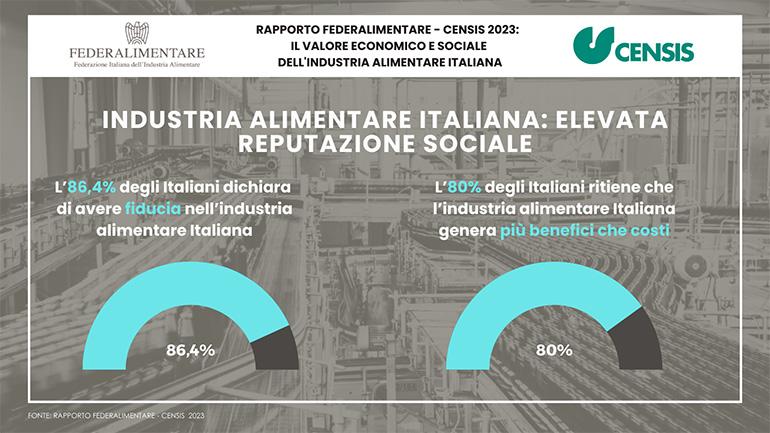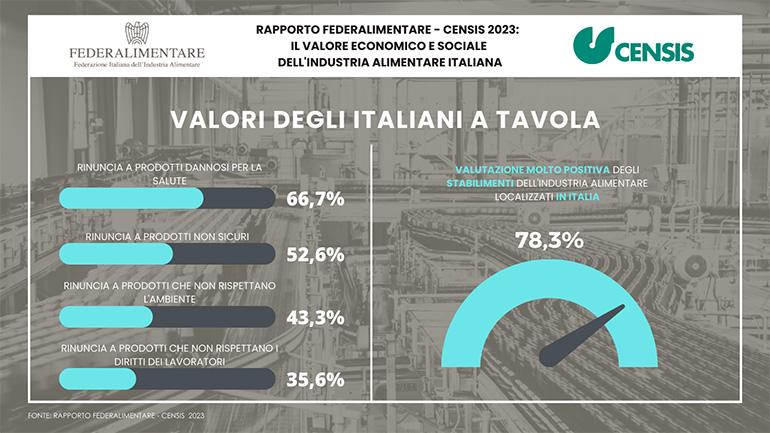The economic and social value of the Italian food industry
It’s not just a giant that generates products and employment, but a complex system that encapsulates values and generates solutions, responding to the wide variety of Italians’ material and immaterial needs. Here we present insights from the Federalimentare-Censis 2023 Report, which paints an original picture of the national food industry and its deep ties with the economy and society.
By Milena Bernardi
In the ranking of Italian manufacturing sectors, it stands in first place for turnover, second place for the number of companies and workers, and also for the value of exports. The Italian food industry boasts 179 billion euros of annual turnover, 60 thousand enterprises, 64 thousand workers and over 50 billion euros of exports per year, equivalent, respectively, to +24.7%, +12.2% and +60.3% in the last ten years.
These are more than satisfactory numbers for considering it a driver of the national economy, but also a keystone on which the psychophysical well-being and quality of life of Italians depends, demonstrating its high social value.
A key element of the Italian food supply chain (607 billion euros, 1.3 million enterprises and 3.6 million workers), the food industry accounts for 16.6% of total domestic expenditure, in line with Spain, higher than France (15.7%), Holland (13.9%), Germany (13.4%) and the EU average of 27 countries (16.1%).
High social reputation
86.4% of Italians declare to trust the Italian food industry. This trust cuts across different generations: 93.8% of the elderly, 84.2% of adults and 81.6% of young people. In addition, 80% of Italians consider that the sector generates more benefits than costs, while 20% think the opposite. The local and national dimension of the Italian food industry is also an aspect much appreciated by 78.3% of interviewees, being considered a source of income and employment. Italian food is an expression of national identity and pride, a synthesis of tradition and contemporaneity, of strong links with local territories and the ability to bring the Italian spirit to the world.
Food styles and values
92.7% of Italians declare to eat a bit of everything without any particular constraints, 7.1% are vegetarian and 4.3% vegan.
More specifically, at the table, 42.1% define themselves as a creature of habit, eating more or less always the same food, 20.5% as an innovator, who likes to try new foods, 9.2% health-conscious, 7% a food enthusiast, 6.3% who only and always eats Italian products, 5.8% a convivialist (who considers food important as an opportunity for socializing with others), and 4.4% a pleasure-seeker (who always eats what they like).
For Italians, finally, ethical and social values are also important, guiding them when shopping or sitting at the dining table: 66.7% are ready to go without products that could be harmful to their health, 52.6% without products that are not in line with food safety criteria, 43.3% those foods whose production and distribution does not respect the environment, and 35.6% those foods for the production of which the rights of workers and suppliers are not protected.
Promotion of wellbeing and consumer welfare
The comprehensive offer of the Italian food industry permits access to desired products for everybody, with a relative positive impact on people’s psychophysical wellbeing (according to 90.7% of Italians). Its sustainable quality in terms of prices, moreover, allows for inclusivity in food consumption, also of more vulnerable social groups.
It is interesting to note that, while not renouncing rigorous control of the family budget, 63.4% of the sample purchases only products of quality for certain foods, regardless of the price. While following diets within the perimeter of traditional Italian ones, 79% appreciate the availability of new products in points of sale. These aspects, alongside the multiple diets followed from day-to-day, describe the extreme complexity of the demand for food products expressed by Italians.
Well-informed consumers
The modern consumer is stimulated to search for information that enables them to evaluate whether a company or a product complies with their value system and with what they claim to be or do. We have an attentive, informed, cautious and often wary consumer, “armed” with the now inseparable smartphone that allows them, in any moment, to search for and select information useful for making their consumption decisions. The question of food safety is a priority, today one of the main drivers of consumer choices, amplified after the emergency experience of Covid-19.
Exporting the national food culture
The exportation of products is also a means for transferring the food styles, reference cultures, territorial identity and, more in general, the lifestyle of a society. While the Italian agri-food sector has already demonstrated extraordinary performance in terms of product quality, appreciated throughout the world as good, healthy and genuine, it is now necessary to further enhance, in the collective imagination of consumers of the markets to be conquered, our distinctiveness, as a creator of biodiversity and a practically unique variety of food and wine. Where food enterprises are obliged to import certain raw materials or semi-finished products not available in the national territory, it’s necessary to identify partner economies that fall within the Italian sphere of influence.
This strategic choice will lead to an intensification of relations with European, Anglo-Saxon and Mediterranean countries, in order to avoid finding ourselves vulnerable in the face of changing geo-political contexts.





















